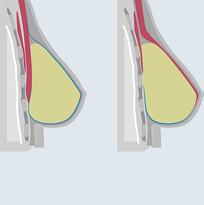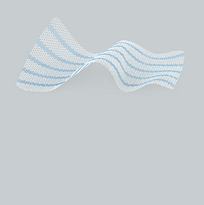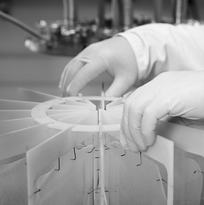Titanised Mesh Implants
pfmmedical have always led the evolution of surgical implants. Having been developed for over 20 years, our pioneering surgical implants offer a complete portfolio to meet all your surgical requirements.
We are a trusted, global, healthcare partner with more than 100,000 implants implanted worldwide.
Our unique titanisation process means reliability and predictability and offers the Surgeon a range of versatile implants of proven quality and results.
- Our extra light, titanised mesh portfolio includes TiMESH, with its universal applications for the treatment of all intraperitoneal and extraperitoneal hernias.
- Our TiLOOP® titanised mesh offers the complete application range for breast reconstruction, whether immediate or delayed, sub-pectoral or pre-pectoral procedures.
TiMESH and TiLOOP® implants distinguish themselves with lower inflammation rates1, less shrinkage1,2,3 whilst at the same time being highly body compatible1,3 and hydrophilic.
The outstanding design of the TiMESH and TiLOOP® portfolio, with their minimal weight but maximum strength composition, promote the ideal conditions for permanent, stable results with desirable tissue ingrowth.
References
- Scheidbach, H., et al., In vivo studies comparing the biocompatibility of various polypropylene meshes and their handling properties during endoscopic total extraperitoneal (TEP) patchplasty: an experimental study in pigs. Surg Endosc., 2004. 18(2): p. 211-220.
- Zhu, L.M., et al., Mesh implants: An overview of crucial mesh parameters. World J Gastrointest Surg, 2015. 7(10): p. 226-36.
- Wood, A.J., et al., Materials characterization and histological analysis of explanted polypropylene, PTFE, and PET hernia meshes from an individual patient. J Mater Sci Mater Med, 2013. 24(4): p. 1113-22.
- Scheidbach, H., et al., Influence of titanium coating on the biocompatibility of a heavyweight polypropylene mesh. An animal experimental model. Eur Surg. Res., 2004. 36(5): p. 313-317.
- Schopf, S., et al., Chronic pain after laparoscopic transabdominal preperitoneal hernia repair: a randomized comparison of light and extralight titanised polypropylene mesh. World J Surg., 2011. 35(2): p. 302-310.
- Babichenko, II, et al., The influence of titanium coating of mesh polypropylene endoprostheses on their biocompatibility. Cell and Tissue Biology, 2016. 10(4): p. 332-339.





